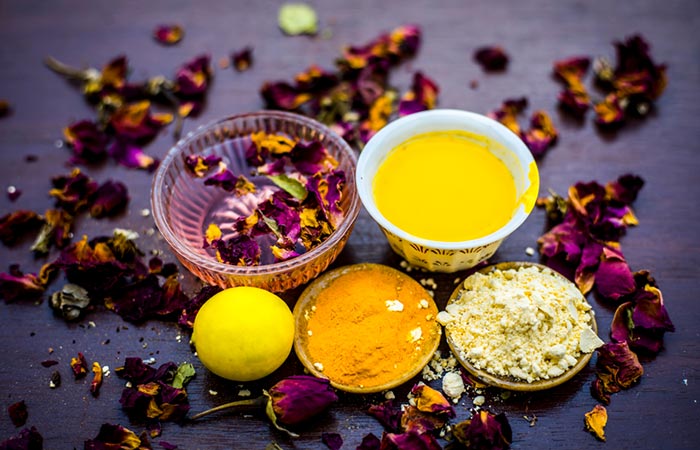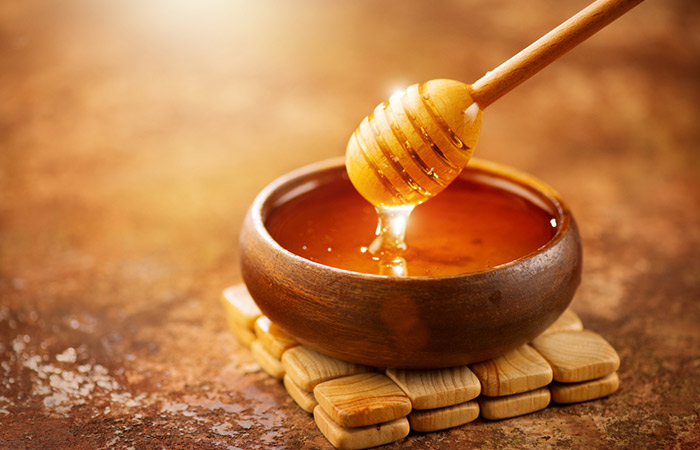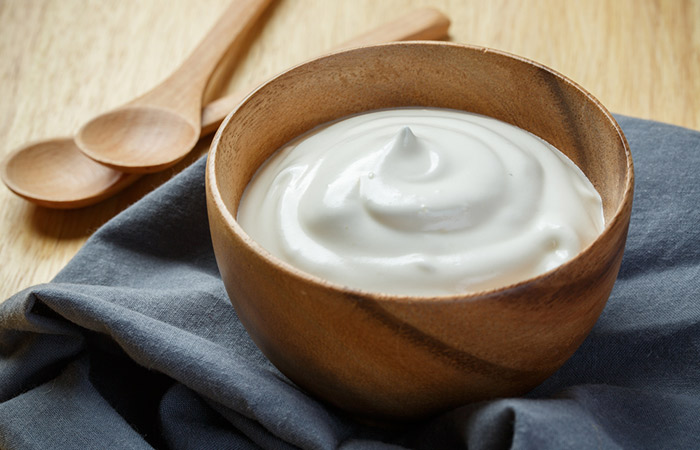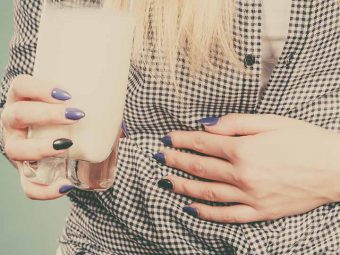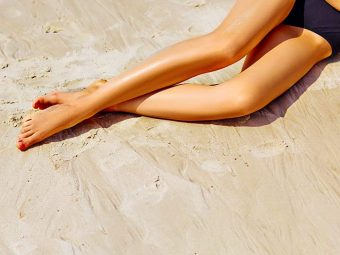8 Natural Cleansers For Clear Skin
Because there are many natural ways of cleansing your skin to make it soft and smooth.
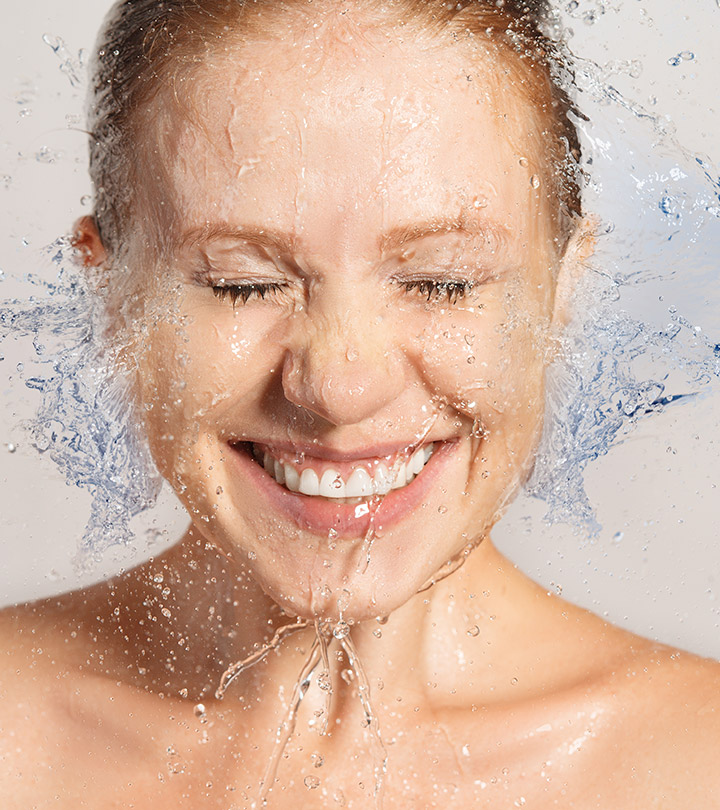
After a long day at work, your skin care regimen almost definitely includes cleansing with a facial cleanser. Cleansing is important to rid your skin of dirt and pollution and allow it to breathe. The more you tend to neglect this basic step, the more skin issues you will develop. If you do not want to use chemical-based or commercial cleansers, head to your kitchen and make use of natural, everyday ingredients to cleanse your face. Here are eight natural cleansers that can make your skin soft, smooth, and radiant.
In This Article
Top 8 Natural Cleansers For Clear Skin
1. Chickpea Powder And Turmeric
Chickpea flour has been traditionally used as a base for face packs. The antioxidant and antimicrobial properties of turmeric powder can help lighten any dark spots on your face, reduce acne, and leave it feeling cleansed and fresh (1).
You Will Need
- 2 tablespoons of chickpea powder
- 1 teaspoon of turmeric powder
- Milk
What You Have To Do
- Make a paste using the ingredients listed above and apply it to your face and neck.
- Leave it on for about 20 minutes and wash off thoroughly with water.
How Often Should You Do This
Do this at least twice a week.
2. Milk
Milk is an effective facial cleanser and makes your skin soft. It contains compounds that can improve skin barrier function (2). This, in turn, helps in improving your skin’s health.
You Will Need
- Salt
- Milk
What You Have To Do
- Make a facial cleanser using milk and salt.
- Apply this to your face and neck using a cotton ball.
How Often Should You Do This
You can do this once or twice a week.
3. Cucumber And Curd
Curd soothes the skin. The bioactive compounds in cucumber can help eliminate age spots and blemishes and leave your skin feeling moisturized and rejuvenated (3).
You Will Need
- Fresh cucumber
- 2-3 tablespoons of curd
What You Have To Do
- Blend the cucumber and
- add a few tablespoons of curd to form a thick paste.
- Apply this paste to your face and neck and leave it on for 10 minutes.
- Wash it off with plain water.
How Often Should You Do This
Apply this paste once or twice a week.
4. Honey
Honey exhibits emollient, humectant, and soothing effects. It not only slows down wrinkle formation but also regulates your skin’s pH (4). This makes your skin look young and glowing.
You Will Need
- Fresh milk
- 2-3 teaspoons of honey
What You Have To Do
- Make a thick paste by mixing milk and honey.
- Apply this paste to your face and neck.
- Leave it on for 30 seconds and scrub your skin lightly.
- Pat your face and neck dry.
How Often Should You Do This
You can use this cleanser 2-3 times a week.
5. Oatmeal Facial Cleanser
Colloidal oatmeal is an amazing facial cleanser. It possesses antioxidant and anti-inflammatory properties that help eliminate dryness of skin (5).
You Will Need
- 1 tablespoon of buttermilk
- 1 tablespoon of oatmeal
- Honey
What You Have To Do
- Make a fine paste by mixing all the ingredients.
- Apply this paste to your face and neck and scrub gently in circular motions.
- Wash off with plain water.
How Often Should You Do This
Do this once a week for clear skin.
6. Coconut Oil
Coconut oil contains
lauric acid and possesses moisturizing properties, thereby eliminating dryness of skin and promoting clearer-looking skin (6).
You Will Need
- 1 teaspoon virgin coconut oil
- 1 teaspoon honey
- 1 teaspoon yogurt
What You Have To Do
- Mix all the ingredients to get a thick mixture.
- Apply it to your face and leave it on for about 15 minutes.
- Rinse off thoroughly.
How Often Should You Do This
Do this 2-3 times a week.
7. Yogurt
Yogurt contains lactic acid that moisturizes your skin and helps alleviate dry and dull skin (7).
You Will Need
- 1-2 tablespoons of yogurt
- 1 tablespoon of honey
- 1 teaspoon of lemon juice
What You Have To Do
- Mix yogurt, honey, and lemon juice in a bowl.
- Apply the mixture to your face and neck.
- Rinse your face after 15-20 minutes.
How Often Should You Do This
You can do this once a week.
8. Lemon
Lemon contains ascorbic acid that, as research shows, can help eliminate excessive pigmentation and blemishes from your face (8). This improves your complexion and makes your skin clearer.
You Will Need
- 1 ripe lemon
- Cotton pad
What You Have To Do
- Extract the juice from a lemon and dab a cotton pad with it.
- Apply this to your face and neck and leave it on for 10 minutes.
- Rinse thoroughly with water.
How Often Should You Do This
You can do this 1-2 times a week.
Caution: Do a patch test before trying this remedy as lemon might irritate the skin. Also, do not step out without applying sunscreen as lemon juice makes your skin photosensitive.
Cleansing is an integral part of any skincare routine. Minus the cleansing, facial pores accumulate dirt, grime, and product residue and get clogged or enlarged. There are several natural cleansers for clear skin that you may opt for if you are averse to chemical-laden or commercialized products. Most of these ingredients are kitchen staples and work efficiently to cleanse and prep the skin for toning and moisturization gently. The most popular options are a paste made from chickpea powder and turmeric, honey, oatmeal, milk, cucumber, yogurt, coconut oil, and lemon for keeping the skin supple and clean.
Frequently Asked Questions
How do you flush toxins from your face?
You can do this by cleansing and exfoliating your face regularly. You can also use any of the remedies mentioned above to make sure your skin is always fresh and healthy.
Should I wash my face with soap or just water?
Washing your face with soap ensures better removal of impurities. However, excessive use of soaps can strip your skin of the natural moisture and oils. Moderation is key.
What should we apply on face before bed?
You can apply a light moisturizer that is non-comedogenic. It should moisturize your skin without clogging the pores.
Sources
- Effects of Turmeric (Curcuma longa) on Skin Health: A Systematic Review of the Clinical Evidence.’, Phytotherapy Research, US National Library of Medicine, National Institutes of Health.
https://www.ncbi.nlm.nih.gov/pubmed/27213821 - A novel mechanism for improvement of dry skin by dietary milk phospholipids: Effect on epidermal covalently bound ceramides and skin inflammation in hairless mice, Journal of Dermatological Science, US National Library of Medicine, National Institutes of Health.
https://www.ncbi.nlm.nih.gov/pubmed/25816721 - Exploring cucumber extract for skin rejuvenation, African Journal of Biotechnology.
https://academicjournals.org/article/article1380726732_Akhtar%2520et%2520al.pdf - Honey in dermatology and skin care: a review. Journal of Cosmetic Dermatology, US National Library of Medicine, National Institutes of Health.
https://pdfs.semanticscholar.org/48d7/6c8cea60d6873d73ddf8d173cb1b4b70271b.pdfhttps://www.ncbi.nlm.nih.gov/pubmed/24305429 - Anti-inflammatory activities of colloidal oatmeal (Avena sativa) contribute to the effectiveness of oats in treatment of itch associated with dry, irritated skin, Journal of Drugs in Dermatology, US National Library of Medicine, National Institutes of Health.
https://www.ncbi.nlm.nih.gov/pubmed/25607907 - Anti-aging Effects of Select Botanicals: Scientific Evidence and Current Trends, MDPI.
https://www.mdpi.com/2079-9284/5/3/54/htm - New lactic acid bacteria for skin health via oral intake of heat‐killed or live cells, Animal Science Journal, US National Library of Medicine, National Institutes of Health.
https://www.ncbi.nlm.nih.gov/pmc/articles/PMC6001785/ - Topical Vitamin C and the Skin: Mechanisms of Action and Clinical Applications, The Journal of Clinical and Aesthetic Dermatology, US National Library of Medicine, National Institutes of Health.
https://www.ncbi.nlm.nih.gov/pmc/articles/PMC5605218/




